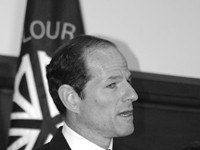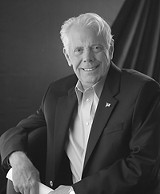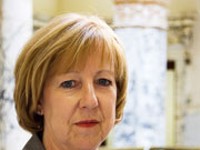Washington watch
In the struggle for control of Capitol Hill this year, Rochester matters
By Krestia DeGeorge[
{
"name": "500x250 Ad",
"insertPoint": "5",
"component": "15667920",
"parentWrapperClass": "",
"requiredCountToDisplay": "1"
}
]
Election 2006
It's a strange feeling.
Here in Upstate New York, we've watched two hotly-contested presidential races unfold elsewhere. By the time we hold our primaries, deep into the national season, the race is usually all but won. And in the general election, Downstate's overwhelming Democratic enrollment advantage means no one bothers to come courting.
So we've grown used to feeling insignificant on the national political stage.
How strange then to suddenly matter. And in such a big way.
Nothing's in the bag, but pundits and political observers are predicting a Democratic victory in the House of Representatives. If that happens, it'll be the first time Democrats have been in control since 1994, when Newt Gingrich and his crusaders stormed Washington brandishing their Contract with America.
To flip control of the House of Representative, Democrats have to pick up 15 seats nationwide. And three of the districts considered in play are in MonroeCounty. Pretty amazing for a county whose population is just slightly larger than that of a single congressional district.
Even two years ago, not much seemed competitive. Jim Walsh, whose 25th district is based in Syracuse but includes Webster, Irondequoit, and part of Penfield, didn't face a major party challenger that year. Newcomer Randy Kuhl romped to an easy victory over Democrat Samara Barend after nasty revelations about Kuhl's divorce records were traced back to one of her campaign aides. Only millionaire Jack Davis --- whose self-funded campaign against House power-broker Tom Reynolds surprised just about everyone --- provided a real race.
This year Davis is back, vowing to spend $2 million of his own money to oust Reynolds. But there are also real races in two of the other three districts in MonroeCounty. Former Pat Moynihan aide and Syracuse television journalist Dan Maffei is taking on Jim Walsh. And in the 29th congressional district, retired Navy Commander Eric Massa is giving Kuhl a serious challenge.
Until the Mark Foley scandal broke, the Kuhl's 29th district was probably the most competitive of the local congressional races. It's tough to tell, because there's been almost no independent polling in the race. The one poll that has been released showed Massa leading by a whopping 12 points --- 52 percent to Kuhl's 40. But that poll was conducted by using an automated method never before employed in House races. It's a touch-tone poll; no live interaction. The Massa campaign is trumpeting the results, and Kuhl's team is writing them off.
"The Majority Watch poll is ridiculous," writes Kuhl campaign spokesperson Bob Van Wicklin in an email. "Their methodology is ridiculous."
Van Wicklin and other doubters cite another district included in the poll. There, the Majority Watch results differed widely from a different independent poll conducted nearly simultaneously.
In any event, it is, after all, just one poll. Either campaign could clear things up by releasing its own internal polls, but by early this week neither had done that --- which signals, if anything, that the race is close.
And polls are just one way to predict an outcome. Another crude but effective way is simply looking at the numbers of voters enrolled in each party. In the 29th district, there are three Republican voters for every two Democrats. Republicans especially dominate in the rural counties in the Southern Tier. Still, there are more than enough independents and third-party voters to swing an election. That's especially true in a year like this, where the war in Iraq, the Jack Abramoff and Duke Cunningham bribery scandals, and the Mark Foley mess have cost Republicans some traction.
There's a real chance, then, that the election could actually be decided on issues. So what are those issues?
For starters, there's the war in Iraq. Massa spent 23 years as an officer in the Navy, which puts him in a perfect position to criticize the war while still supporting the troops. The Kuhl campaign seems to have gambled early on that the best way to confront this apparent advantage was head-on.
Kuhl traveled to Iraq with a delegation of Congressional representatives earlier this year and returned with glowing reports of the putative success of both the United States' military and Iraq's civil structure. It's tough to tell whether that strategy is working with voters in the 29th, but in recent days some Republicans have backed off from the administration's rosy assertions. And even the president has changed tactics --- at least, in how he deals with the press --- by beginning to speak about changing tactics in Iraq.
So far, Kuhl has stayed his own course, defending the war and spinning it as an effort that's going well.
In an impromptu interview following Vice President Dick Cheney's stump speech in Rochester on his behalf, Kuhl echoed the veep's line that fighting terrorists in Iraq is preferable to fighting them here.
"Do I wish the war were over today? Absolutely," he said. "But I'm not about to walk away from the commitment that we've made. I'm not about to see a humanitarian travesty happen in Iraq as a result of our separation at this point."
And he blamed the news media for public malaise over the war.
"If all they [the public] see is what's on the national news as far as what's being reported out of Iraq," he said, "then they don't necessarily understand the full importance of our presence there."
Eric Massa believes he understands the importance of the US presence in Iraq. But he doesn't agree with the Kuhl over what that significance is. The war in Iraq "is making us less safe," says Massa, adding: "By our very presence in Iraq, we are creating the instability that we seek to fight."
Unlike many Democrats, Massa has a concrete plan for Iraq, based on his NATO experience.
"I subscribe to what I call the Bosnian solution," he says. "I believe that we need to allow for the creation of three semi-autonomous, economically viable states. And allow them to create a federated government of their own choosing. We will never be successful creating a democracy at the end of a bayonet. It won't happen."
He hedges only slightly when asked if he'd set a timetable for a withdrawal of American troops.
"You know, if the president said we're leaving today, it would take between six and 18 month for that to happen," he says. "But I can come up with no justification for the presence of large numbers of American military troops in Iraq two years from today."
If Massa's military experience informs his position on the war in Iraq, it does so doubly on the issues of torture and extraordinary rendition. The normally animated candidate becomes even more animated, and also more eloquent, as he lays out his opposition to the arrangement on torture recently agreed upon between Congress and the president.
"The reason we signed the Geneva Conventions was never because we anticipated equal treatment from our enemies," he says. "But we defined ourselves as a people and we defined ourselves as a nation by how we treated those that we imprisoned and incarcerated. We are a nation of laws."
At this point his face is ever so slightly contorted and his voice just discernibly strained, as if by an effort to hold in anger over the issue. But he manages to keep it even.
"We are stronger when those who seek to do us harm are brought to justice in the light of day, not in the dark of night, not without trial, not without writ of habeas corpus," he says. "When you torture a prisoner, the information you received is at best tainted and at worst, much worse. It has no usable military value."
"This all military professionals know," says Massa. "And a very dear friend of mine who was a POW in Viet Nam for over six years is my closest counselor on this topic. He was brutally tortured for months on end, and yet he told me to stand firm against the political expediency of populist legislation that espouses torture for our enemies. It doesn't help us. It hurts us."
Kuhl didn't address the issue of torture directly during Cheney's visit (and subsequent efforts to secure an interview with him failed). But Cheney, speaking at his fundraiser, called the agreement a good one, and Kuhl had nothing but praise for the vice president's address afterwards.
That kind of reliable approval of the administration has (predictably) earned Kuhl the wrath of progressives in the district who see him as moving in lock step with Bush. Massa frequently uses the phrase "rubber-stamp Congress" when discussing his opponent's positions. According to the Capitol Hill magazine Congressional Quarterly, Kuhl voted in favor of bills the president wanted 85 percent of the time. (Of the nine Republican House members from New York, he had second highest score of voting with the president.)
There is one area where Kuhl is willing to defy President Bush, though. It's over the issue of immigration. While Bush has advanced immigration reform that includes a guest-worker program, Kuhl derides that as "amnesty" and takes a hard line against illegal immigration. That stance might make more sense in other parts of the country. But in Kuhl's district, where agriculture is one of the top industries, and where the economy in general is weak, it's more puzzling.
After the Cheney event, he addressed the question of how to balance the needs of farmers (who, according to conventional wisdom, are securely in his base) with his views on immigration.
"The House bill was aimed totally at securing our borders. That's the first step," he said. "There's another step that has to come after that, but you have to deal with the issue of no amnesty within that. The agricultural community probably most notably needs a legitimate workforce. I want to work to see that."
But how do you go about doing that?
"Well, there are several ways you can do it," he said. "Item one is to secure the borders. And then any kind of a, say, enlargement of the visa quotas, [or] some sort of a temporary workforce that you can set up to bring people in: all those are potential ways. Nobody's outlined a way of doing it that's going to be the absolute answer at this point. But yeah, there's a need there, there's no question about it."
There are, of course, plenty of other issues, most of which Kuhl and Massa disagree on: trade policy, foreign policy, health care, energy policy. But it's not hard to predict each man's stance. With the exception of immigration, Kuhl tends to vigorously support the Bush administration. Massa, who mostly holds moderate, centrist positions (his support for universal health care is one notable exception) usually criticizes it.
Massa's centrism shouldn't be a surprise. He was a Republican for years, switching sides only after he became disgusted with the Swift-boating of veterans like John Kerry in the 2004 elections.
"Karl Rove and Tom DeLay corrupted the system in Washington, DC, beyond the ability for Thomas Jefferson or Alexander Hamilton to even recognize what we've become. And it's wrong," he says, voice rising.
"I haven't changed, and neither has the American public. I fight for a balanced budget. I fight for the American value of quality health care for all Americans. I fight for jobs in this country for our friends and neighbors. The Republican leadership has abandoned all of those values. And we need to restore them."
The 26th district Congressional race pits another former Republican against a party stalwart.
Jack Davis, a millionaire businessman who's taking on Tom Reynolds, spent most of his life as a conservative Republican. It's not clear whether he's left those beliefs behind.
"Maverick" is a word that gets used to the point of abuse in political reporting. But it's hard to imagine a candidate for whom the tag is more apt.
In the two years since Davis lost to Reynolds, he's been campaigning not for office but against the United States' trade policies. His "Save American Jobs" campaign focuses on preserving the high-wage, high-skilled manufacturing jobs that once built the backbone of the rust-belt economy. There are a lot of reasons for the loss of those kinds of jobs. But Davis pins it on poor trade policies that he says help China and hurt us.
And he rejects notions about the inevitability of globalization.
Asked by City Newspaper whether large-scale shifts in the global economy aren't simply the way the world works, he vehemently disagreed.
"It doesn't have to be," he said. "The government changes the way the world works. Countries for centuries charged tariffs."
Davis wants to bring back "trade-balancing" tariffs, duties that nations charge on imports to protect their own industries.
"We have a trade deficit with every industrializing nation in the world," he says.
Davis talks a lot about trade and jobs and little about anything else. That's made him ripe for criticism that he's a single-issue candidate.
A television reporter for a Buffalo station confronted that question head-on at an impromptu Davis press availability, after a labor event in Rochester. (As with Kuhl and Tom Reynolds, efforts by City Newspaper to set up an interview were unsuccessful.)
Introducing Davis at the press event, Assemblyman Joe Morelle had hailed Davis's "singular focus": jobs and the economy.
"Do you think you have a singular focus?" the reporter asked.
"Oh, definitely not," was the reply. And then Davis proceeded to lecture the press corps about the importance of jobs.
After the event, Davis's press secretary, Curtis Ellis, did his best to spin his boss's response into a strength.
"He's not a single-issue candidate, he's a single-priority candidate," said Ellis.
But Davis might as well be a single-issue candidate and in another sense, he is. Only the issue isn't really jobs and trade; it's a referendum on Republican control of the House.
Davis's opponent has admitted as much. It's Reynolds' job, as head of the National Republican Congressional Committee, to get Republicans elected to the House of Representatives. And from that vantage point, he cast his own race as part of a referendum on his party's performance.
At the height of a fire-and-brimstone stump speech to party faithful in Rochester in October, here's what Reynolds had to say:
"[There is] a lot of talk this year about whether Republicans are going to get trounced across America. [About] what it looks like right in this district. Ladies and gentlemen, this race is about a choice."
"It's a choice," he said, when all elections in Congress are tallied, "if the Republicans are actually running the place when we look at the continuation of where we are in the war on terror. Where we are with North Korea. Where we are on homeland security. Where we are in keeping the economy going."
John McCain, in his telephone address to the audience that day, seconded that assessment, and pointed out the greater symbolic significance of this particular race.
"There's a lot at stake in Tom Reynolds' reelection," he said. "They believe that if they defeat him, then it's much larger than just one Congressional district, because he's one of the foremost leaders of our party in the Congress."
But even if this race is about nothing other than political power in Washington, it's still a singularly interesting one. In keeping with his maverick image, Davis hasn't been out campaigning much. In fact, he's said publicly he dislikes the glad-handing, baby-kissing parts of working a district and would gladly dispense with them if he could. He prefers to be at work in the heating-element factory he operates in Akron, a Buffalo exurb. Still, something in his anti-globalization message must have been resonating in this corner of the rust belt, because he slowly eroded Reynolds lead until a poll at the end of September showed the two in a virtual dead heat.
Then along came Mark Foley.
It's tough to say what this race would've looked like without the revelations about Foley's activities. Or revelations about the actions of GOP leadership, including Reynolds, leading up to the scandal.
A hastily arranged Reynolds press conference and a subsequent tepid mea culpa that aired on television stations in the district seemed only to make matters worse.
The controversial Majority Watch poll, conducted in the scandal's immediate aftermath, showed Davis suddenly leading by an astounding 56 percent to 39 percent. A Zogby poll performed around the same time for the Buffalo News also showed Davis with a healthy edge.
But the Foley scandal may have come too soon to prove fatal to Reynolds. It took place more than a month before election day, giving voters time to forget and the party apparatus time to work. Last week, Buffalo's WGRZ released another poll. This one showed Reynolds with about a 5-point lead over Davis.
If Davis is hard to assess on the issues, so is his opponent. In place of the "issues" page on most campaign websites, Reynolds' site has one titled "Vision." It lists a few specific tax cuts he's for --- eliminating the marriage penalty and the "death tax," for instance. But there's just as much in the way of little-meaning platitudes about like fighting waste, fraud, and abuse in the Medicaid system or fighting to save jobs.
According to Congressional Quarterly's ratings, he voted with the president 80 percent of the time in 2005. In heavily partisan votes, another benchmark the magazine uses to determine independence, he voted with Republicans on 94 percent of bills.
Incumbent Jim Walsh sports similar numbers: he voted with the president 86 percent of the time last year and with his party 92 percent. That conservative record is surprising coming from him, since in his district he has cultivated an image of a moderate. For example, earlier this summer he was in Rochester accepting an award from the Rochester-based Center for Environmental Information. He's played a major role in funding one of the center's cornerstone programs, the Lake Ontario Coastal Initiative.
That's probably prudent, since his district contains more Democrats than do Kuhl's and Reynolds' --- and the district includes the heavily Democratic city of Syracuse. Walsh's Democratic challenger, Dan Maffei, with the help of the state Democratic Party, has tried to highlight that disparity between Walsh's moderate image and conservative voting record. But it's tough to say whether he's succeeded. There's been little independent polling on the race. The Majority Watch Poll that predicted a wave of Democrats in Upstate districts had Maffei leading by 8 percentage points --- somewhat less than the lead it gave Dems in other districts. And a Zogby poll commissioned by the Syracuse Post-Standard was scrapped after errors were discovered.
The fickle nature of polls --- and voters, for that matter --- means it's too soon to predict the outcome of this year's midterms. But that hasn't stopped plenty of people from doing it anyway. One of them is the National Journal's Chuck Todd, whose House Race Rankings are arguably the most read and discussed, by Washington watchers. In his October 23 update, Todd opened his roundup this way:
"It now looks as if the Democrats are poised to win the 15 seats they need to win control of Congress."
That may or may not be the case: Reynolds' district is among Todd's top 15 tightest races. But assuming he's right, what would a Democratic majority in the House mean for this area?
For starters, it would mean the ascendancy of Louise Slaughter. The representative of the 28th district is dean of the local delegation and one of the most liberal-voting members of Congress. (Yes, Slaughter has a nominal challenger: Tonawanda Councilmember John Donnelly. But here's an indication of how little even Republicans think of the race: Reynolds, who's the man most in charge of electing Republicans to the House, held his own fundraiser in the 28th district, but neglected to even mention him.)
If the Democrats take control of the House, Slaughter's seniority will pay big dividends. She would become the first woman in the nation's history to chair the House Rules Committee. That may sound boring, but the committee deals with the kind of procedural details that mean the difference between a truly open democracy and a caricature of one.
Democrats have been complaining about underhanded rules practices in the House for years. If they win, they'd have a chance to do something about it, and Slaughter would be the woman to do it. While ranking minority member on the committee, she compiled a nearly 150-page tome on the subject, with the only slightly portentous title "The Death of Deliberative Democracy."
"A Democratically controlled Rules Committee will mean a more open, transparent, and fair legislative process in the House of Representatives," Slaughter said in an e-mail to City Newspaper. "That means cutting off the closed-door dealings which have permitted corruption to define this Congress."
Beyond Slaughter's ascendancy, a lot about what a Democratic House looks like from Rochester's perspective would depend on who gets elected. But at least one candidate's already given it some thought.
"You know, Rochester was carved into four congressional districts trying to make sure that no Democrat would ever enjoy a safe seat," says Eric Massa. "But this year we're going to elect four Democrats. And for a city the size of Rochester to send its own Congressional caucus is very, very exciting. The much increased clout politically in Washington, DC, of the Rochester Congressional delegation is going to pay significant benefits not only for MonroeCounty but for the entire region."
Speaking of Congressional Elections, UpstateNew York Elections
Latest in News
More by Krestia DeGeorge
-

Designers get their turn at downtown
Jan 17, 2007 -

The last wild Finger Lakes
Jan 17, 2007 -

From the new governor: fighting words
Jan 10, 2007 - More »







